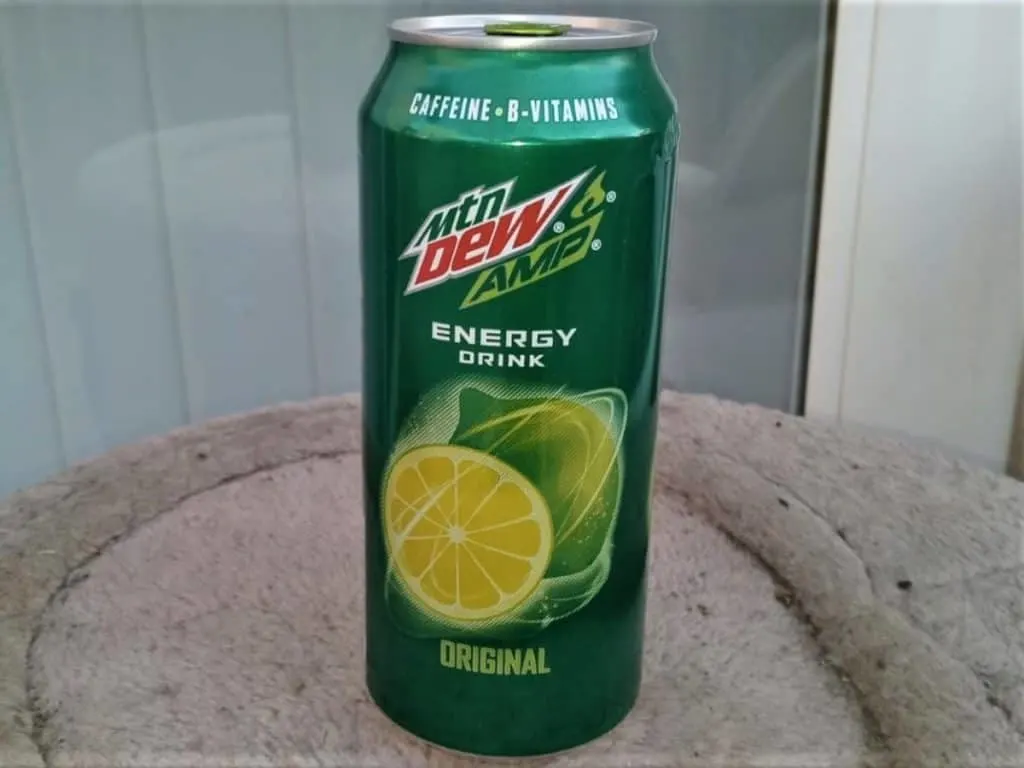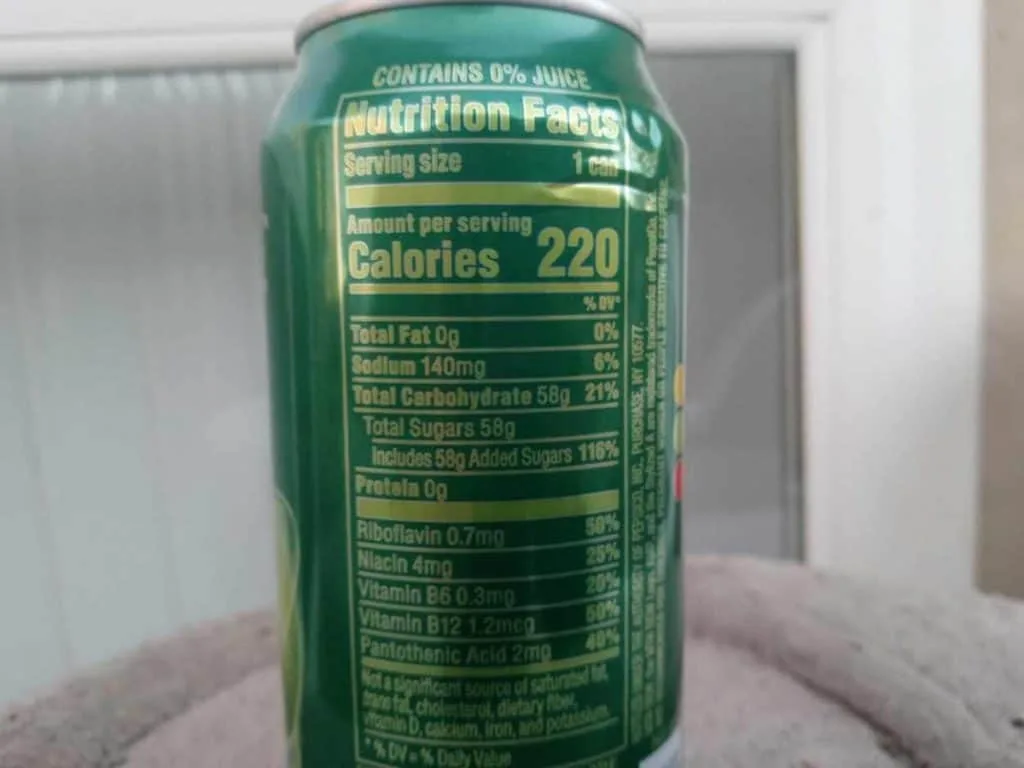There are tons of dietary restrictions that many people have to follow, either for medical, ethical, or even spiritual reasons.
Those with gluten allergy who cannot tolerate gluten-rich foods like bread, cake, cookies (anything with flour in it really), have no choice but to avoid these sweet delicacies that we as a society have grown so fond of.
While I would say that energy drinks are a poor substitute for cakes and cookies, they are a necessity for some people during hectic mornings and slow afternoons when you just need a little pick-me-up.

So, is Mountain Dew AMP gluten-free?
The short answer to AMP being gluten-free is yes. Although it has no official stamp that shows that it is, AMP’s ingredients have no indications of wheat, bread, and rye which are ingredients that contain gluten.
However, if you have serious or even life-threatening gluten-allergy, do consult your physician to see if it’s safe for you to drink.
In this article, I’ll tell you why AMP’s ingredients are gluten-free, and whether you should live a gluten-free life or not.
Contents
Is It Necessary to Go Gluten-Free?
If you do not happen to have celiac disease, a wheat allergy, wheat intolerance, or any form of non-celiac gluten sensitivity, then no you don’t need to go gluten-free.
If you don’t have any gluten allergies, you can definitely try a low-gluten diet, but you should not cut gluten out entirely from the diet. This is to prevent you from experiencing nutritional deficiencies.
However, if you do have those type of health problems, then you should avoid:
- Wheat
- Barley
- Malt
- Triticale
What Are the Uses for Gluten?
Gluten is used for a variety of foods and drinks. Wheat is found in thousands of products on the grounds that it enables products to have a structure and thickens it as well.
Gluten is the foundation of foods like pizza or bread. Without gluten, food may not have the desired textured that we’re so used to.
Is a Gluten-Free Diet Healthy for Non-Celiacs?
Gluten-free diets have become increasingly popular, especially in the United States where one out of five people have reduced, or completely removed gluten from their diet, despite the fact that only 1% of the population has celiac
It’s been claimed that going gluten-free has benefits such as weight loss, improved health, and increased energy — but further research is needed to strongly support these claims.
Avoiding gluten can also make you avoid processed foods since gluten is found in a lot of processed foods. This can lead you to eat healthier and avoiding foods that give you little to no nutrients.
However, non-gluten allergic people shouldn’t cut out gluten entirely out of their diets because most gluten-rich ingredients like wheat flour are fortified with essential nutrients like “fiber, iron, folate, niacin, thiamine, calcium, vitamin B12, phosphorus, and zinc.”
So if you want to go gluten-free (or low-gluten), be sure to replace your gluten with “healthy, naturally gluten-free grain, such as quinoa or buckwheat”.
However, it can also come with risks, as even though living gluten-free has its fair share of benefits it also has some negative effects, especially for those without gluten allergies.
Nutritional Deficiency
Being gluten-free can make you deficient in nutrients such as iron, vitamin B12, calcium, folate, zinc, vitamins A, D, E, and K.
Constipation
Since going gluten-free means eliminating wheat products, you become low in fiber. Without fiber, you’re prone to unhealthy bowel movements which can lead to constipation.
So remember that if you’re trying to remove gluten from your diet, make sure you replace it with fiber from fruits like berries, pears, melons, and oranges. You can also get fiber from vegetables like broccoli, carrots, and sweetcorn.
What Happens to Your Body If You Consume Gluten?
If you have gluten-related health problems, consuming gluten will damage the small intestine.
This damage that the gluten does to your body (if you have celiac disease) can prevent the absorption of nutrients from the food/drink you consume.
It can lead to symptoms like:
- Diarrhea
- Abdominal Pain
- Bloating
- Nausea
- Fatigue
Celiac disease is one of the common autoimmune diseases along with Addison disease, dermatomyositis, graves disease, Hashimoto thyroiditis, multiple sclerosis, and Pernicious anemia.
Medline Plus
For those who don’t have gluten-health-related problems, consuming it is actually normal and fine.
Gluten makes foods/drinks flavorful and here’s a video to prove it:
What Is in AMP Energy Drink?
AMP gives you energy due to its caffeine which prevents you from feeling sleepy and keeps you productive at work or while studying.
AMP’s main ingredient is actually just carbonated water and high fructose corn syrup. You don’t actually see caffeine until you get to number 8 on the ingredients list.

AMP Nutrition Facts
The table seen below can let you see AMP’s nutrition facts along with their amounts. It has a lot of sugar for a small can, so that’s something to watch out for even if it is gluten-free.
| Nutrients | Amount |
| Calories | 220 |
| Vitamin B2 or Riboflavin | 0.7mg |
| Vitamin B3 or Niacin (as niacinamide) | 4mg |
| Vitamin B5 or Pantothenic Acid (as calcium pantothenate) | 2mg |
| Sodium | 140mg |
| Added Sugar | 58g |
| Vitamin B6 or Pyridoxine (as pyridoxine hydrochloride) | 0.3mg |
| Vitamin B12 or Cobalamin (as cyanocobalamin) | 1.2mg |
AMP Ingredients
We’ve talked about AMP’s ingredients in a previous article, so you can go check that out. Here’s the complete list of what’s inside a can of Mountain Dew AMP.
- Carbonated water
- High fructose corn syrup
- Citric acid
- Concentrated orange juice
- Natural flavor
- Sodium benzoate
- Sodium polyphosphates
- Caffeine
- Guarana seed extract
- Gum Arabic
- Vitamin C or ascorbic acid
- Taurine
- Calcium Disodium EDTA
- Panax ginseng root extract
- Yellow 5
- Natural apple extract
- Blue 1
Based on the information above, signs of wheat, rye, and barley are not found. So even though it’s not official, it’s safe to say that AMP is gluten-free.
Is AMP energy drink healthy?
Since AMP Energy Drink contains a lot of sugar and is sweetened with high fructose corn syrup, it’s best to consume it in small quantities and not make it a regular part of your diet.
AMP Energy Drink is a solid energy drink that will give you a boost, but it has a few major flaws that make it less desirable. These include a lack of taste variety and an excessive amount of sugar.
Are AMP energy drinks being discontinued?
Markets in the United States, the United Kingdom, Canada, and portions of Europe and Asia stock AMP Energy beverages. However, in other countries, AMP energy drinks are unavailable because they have not been approved by the relevant authorities.
Furthermore, the absence of a distribution arrangement may prevent AMP from selling its energy drinks in other nations.
Conclusion:
If you’re trying to live more healthily, you may have seen articles about being gluten-free or some people may have promoted that kind of movement. However, do you really need to be gluten-free or can you still eat gluten and be healthy?
The reason why people go gluten-free is because of certain types of diseases and health problems like celiac disease, wheat allergy, wheat intolerance, or non-celiac gluten sensitivity. They can’t eat gluten because doing so will damage their small intestine.
If you’re also wondering if there are other energy drinks that are gluten-free, the answer is yes! Red Bull and Monster are some of the examples of energy drinks that are considered gluten-free.
Eating gluten is fine if you don’t have gluten-health-related problems, it actually makes foods and drinks taste better. But if you eat gluten products and you’re diagnosed with those diseases, symptoms like vomiting, diarrhea, and abdominal pain will occur.
Since there are no indications of wheat, barley, or rye in the ingredients list, it’s safe to say that even though it’s not officially stated on the product, Mountain Dew AMP is gluten-free (but double-check with your physician, just to be sure).
